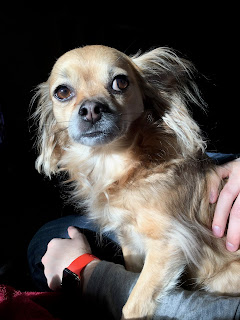We hear a lot about consent in dog training. It's important that dog owners are able to give informed consent, which means that trainers and behavior consultants need to give clear and honest descriptions of what they will do to the client animal, why they are doing this and not some other intervention, and what to expect if it works (or doesn't).
Consent matters with dogs too. For example, we can set up their environment so that there's no penalty for refusing to engage with the behavior modification or training program, and we can take breaks to give them the chance to choose to re-engage. Anecdotally, this allows for a less stressful learning experience for the dog.
But there's a third, less obvious area where consent is part of a behavior consultant's practice: online.
There's a consensus that people love to see their pets on the Internet, and I can't really dispute that. I'm pretty much exactly that guy: if my dog became Internet famous, I' be well, I'd be very confused, but I'd also be kinda pleased. We like it when strangers respond to our pets the same way we do, it's fun. However, there is the potential for an ethical problem when trainers and consultants share pictures and video without their client's consent.
 |
| "I totally deserve to be famous" |
Even if 99% of the time, the client is flattered, and even if 100% of the time it's shared with the best of intentions, it's still unethical to share footage of client animals without express consent.
The client may not want footage of the inside of their home, or of their neighborhood shown to the trainer's online world. On the serious side, the client may be in witness protection, have had problems with stalkers or other kinds of harassment, or not want to reveal to other family members that they contracted with the behavior consultant in the first place. Or it could simply be that the client wants to keep their social media profile free of too much identifying information: having multiple profiles for different parts of life is commonplace, so it's dangerous to assume the person you talk to in real life is the "same" as their persona on social media.
No matter the reason, clients ought to know when their personal information is being shared and have a chance to stop it happening, so consent is always needed. Inviting an animal behavior consultant into one's home creates a bond of trust: the client often ends up sharing some quite personal details about their lives, and consultants have an obligation not to violate privacy. Even if the client is not in the picture or video, the potential that they could be identified is always there.
All that's needed to address this issue is a verbal agreement, or a line in your contract of services. Probably, 99 out of 100 of your clients will think you're being excessive, but for the sake of that one who says, Actually, it's worth taking the extra step to make sure before you share.
No comments:
Post a Comment